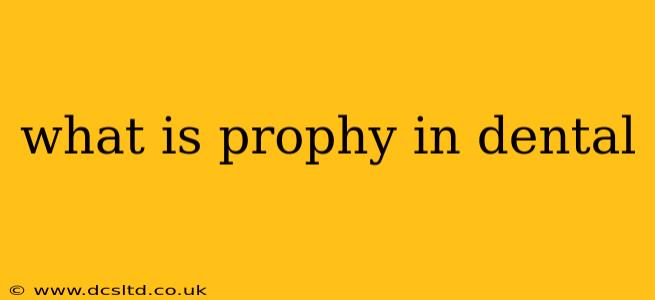A "prophy," short for dental prophylaxis, is a professional cleaning of your teeth performed by a dentist or dental hygienist. It's a crucial part of preventative dentistry, going far beyond what you can achieve at home with brushing and flossing. This procedure is designed to remove plaque and tartar buildup, polish your teeth, and ultimately help prevent cavities, gum disease, and other oral health problems.
What Does a Dental Prophylaxis Involve?
A typical dental prophylaxis involves several key steps:
- Examination: The process begins with a thorough examination of your teeth and gums to identify any potential issues, such as cavities, gum disease, or other concerns. This often includes x-rays.
- Scaling: This is the removal of plaque and tartar (calculus) from above and below the gum line using specialized instruments. Plaque is a sticky film of bacteria that constantly forms on your teeth, while tartar is hardened plaque that's much more difficult to remove.
- Root Planing (If Necessary): If gum disease is present, root planing may be necessary. This involves smoothing the tooth roots to remove bacteria and toxins that contribute to gum inflammation.
- Polishing: After scaling and root planing (if performed), your teeth are polished to remove surface stains and leave your teeth feeling smooth and clean. This step enhances the overall appearance and helps prevent future plaque buildup.
- Fluoride Treatment (Often Included): Many dentists include a fluoride treatment as part of a prophylaxis. Fluoride helps strengthen tooth enamel, making teeth more resistant to decay.
- Oral Hygiene Instructions: The procedure often concludes with personalized instructions on maintaining optimal oral hygiene, including brushing, flossing, and the use of mouthwash.
What are the Benefits of a Dental Prophylaxis?
Regular dental prophylaxis offers numerous benefits:
- Prevention of Cavities: Removing plaque and tartar prevents the acids produced by bacteria from eroding tooth enamel, thus reducing the risk of cavities.
- Prevention of Gum Disease (Gingivitis and Periodontitis): Regular cleanings help remove plaque and tartar buildup, which are the primary causes of gum disease. Early detection and treatment are key to preventing serious complications.
- Early Detection of Oral Cancer and Other Problems: The examination during a prophylaxis allows dentists to detect early signs of oral cancer, gum disease, and other oral health problems.
- Improved Breath: Removing plaque and bacteria significantly improves breath freshness.
- Whiter Teeth: Polishing helps remove surface stains, making your teeth look brighter.
- Healthier Gums: Removing irritants helps reduce gum inflammation and bleeding.
How Often Should You Get a Dental Prophylaxis?
The recommended frequency of dental prophylaxis varies depending on individual needs and risk factors. Most dentists recommend professional cleanings every six months, but those with a higher risk of gum disease or cavities may require more frequent cleanings. Your dentist will advise you on the best schedule for your specific situation.
What's the Difference Between a Prophy and a Regular Cleaning?
The terms "prophy" and "regular cleaning" are often used interchangeably. They both refer to the same procedure: a professional cleaning of your teeth by a dental professional.
Is a Prophy Covered by Insurance?
Most dental insurance plans cover at least a portion of the cost of a dental prophylaxis. However, the specific coverage varies depending on the plan, so it's always best to check with your insurance provider.
Can I Get a Prophy Without an Exam?
No. A thorough examination is always a crucial first step in a dental prophylaxis to assess your overall oral health and identify any potential problems. This examination helps the dental professional tailor the cleaning and any necessary treatment to your individual needs.
By understanding the importance of dental prophylaxis and scheduling regular cleanings, you can significantly improve your oral health and prevent many common dental problems. Remember to discuss any concerns you may have with your dentist. They can provide personalized recommendations based on your specific needs and risk factors.
